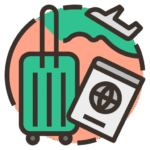Hotels in Japan
Essential Travel Tools for Japan
Every trip starts with the basics. These tools are the backbone of traveling in Japan. From transport to internet, we’ve listed the essentials every visitor needs — with direct links to our in-depth guides.
Best Areas to Stay in Tokyo 🏙️
| Shinjuku – nightlife, skyscrapers, shopping. | 👉 Shinjuku Washington Hotel |
| Shibuya – iconic crossing, young & trendy vibe. | 👉 Shibuya Granbell hotel |
| Asakusa – traditional Tokyo with Senso-ji temple. | 👉 Vessel Inn Asakusa |
| Tokyo Station / Ginza – business + luxury shopping. | 👉 Toyoko Inn Tokyo |
| Ueno & Akihabara – museums, anime, and otaku culture. | 👉 APA Hotel |
Best Hotels in Kyoto 🏯
| Gion & Higashiyama – geisha district, temples, tea houses. | 👉 Kyoto Gion Hotel |
| Kyoto Station – easy access for day trips. | 👉 Sotetsu Fresa Inn |
| Arashiyama – bamboo forest, quiet stays. | 👉 Hotel Arashiyama |
Best Hotels in Osaka 🍜
| Namba & Dotonbori – food paradise, neon nightlife. | 👉 Red Roof Inn |
| Umeda – shopping malls, easy connections. | 👉Hotel Elcient Osaka Umeda |
| Shin-Osaka – practical for shinkansen travelers. | 👉 Sarasa Hotel |
🔑 How to Book Hotels & Ryokan in Japan — Step by Step
Finding the right hotel or ryokan in Japan is easy when you know the flow. Follow these steps to compare prices, understand room types (business hotels, capsule, ryokan with onsen), and secure flexible cancellation — all in a few clicks.
1 Choose your platform
- Use trusted hotel booking platforms available in Japan.
- Compare total price, taxes, breakfast, cancellation policy and payment options.
- Tip: save favorites and check the location on a map before confirming.
2 Pick city, area & dates smartly
- Tokyo: Shinjuku/Shibuya (urban life), Ginza/Tokyo Station (luxury/business), Asakusa (traditional).
- Kyoto: Gion/Higashiyama (temples), Arashiyama (nature), Kyoto Station (base for day trips).
- Osaka: Namba/Dotonbori (food), Umeda (connections), Shin-Osaka (easy Shinkansen access).
- Avoid peak rates by booking early for sakura (Mar–Apr) and momiji (Oct–Nov).
3 Filter by property type & essentials
- Ryokan (tatami + futon, kaiseki dinner, onsen).
- Business hotel (compact rooms, affordable, excellent location).
- Capsule (budget-friendly, unique experience, shared spaces).
- Luxury (5★, suites, views, spas).
- Filters to check: near JR/metro station, onsen/private bath, non-smoking, breakfast included, 24h reception.
4 Read the small print (and reviews)
- Check cancellation policy (many allow free cancellation up to 24–48h before).
- Confirm local taxes and whether you pay now or at the hotel.
- Check room size (Japanese rooms are often compact) and if there’s an elevator.
- For ryokan: confirm dinner/bath times, onsen rules, and tattoo policies.
5 Book with flexible rates + map logic
- If plans may change, choose refundable rates.
- Stay close to JR/metro stations to save time on transport.
- Tip: “Reserve now, pay later” options help you lock in the best price without risk.
6 Check-in, breakfast & luggage tips
- Check-in: 15:00–16:00, check-out: 10:00–11:00 (varies).
- Breakfast: Western, Japanese or mixed; worth it if you have busy days ahead.
- Use takkyubin (luggage forwarding) between hotels for lighter train travel.
❓ Hotels & Ryokan in Japan — Frequently Asked Questions
What’s the average price per night?
Business hotels: ¥8,000–15,000; ryokan with dinner/onsen: ¥18,000–40,000; luxury 5★: ¥35,000+. Prices rise quickly during holidays and peak seasons — book early.
Are ryokan suitable for families?
Yes. Tatami rooms are perfect for families. Confirm onsen rules, dinner times, and the availability of private baths (kashikiri).
Can I get a room with a private onsen?
Yes, in places like Hakone, Beppu, Kusatsu, Noboribetsu. Filter by “private bath/onsen”. They are in high demand — book early.
Do hotels have English-speaking staff?
In tourist areas and major chains, yes. In traditional ryokan, English may be limited but hospitality is excellent and instructions are usually clear.
Are tattoos allowed in onsen?
It depends on the property. Some are tattoo-friendly, others allow patches. For full privacy, book a room with a private bath.
What’s the difference between ryokan vs. hotel?
Ryokan: traditional Japanese stay (tatami, futon, kaiseki dinner, onsen, fixed schedules). Hotel: international comfort, more flexible, often cheaper. Many travelers combine both for a complete experience.









